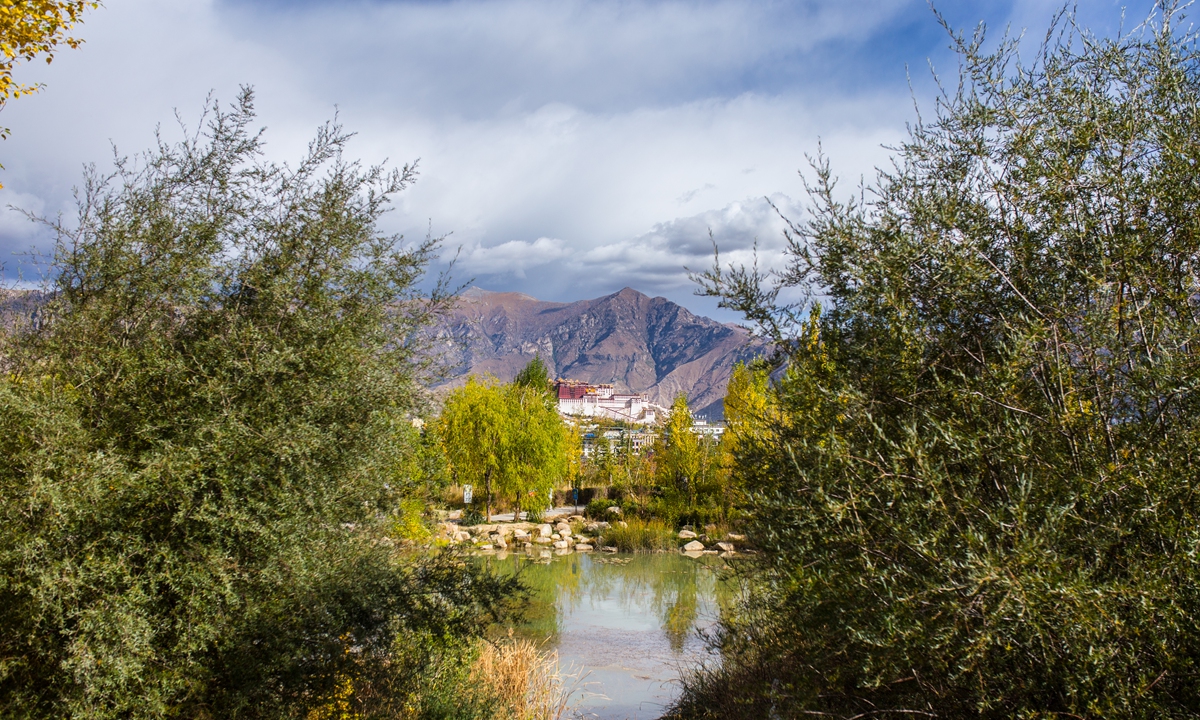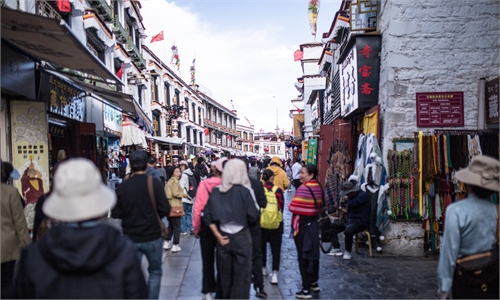Lhasa’s afforestation brings happiness to residents, supports carbon reduction and sequestration

The Potala Palace in Lhasa, Southwest China's Xizang Autonomous Region, is reflected in a lake in Nanshan Park on October 12, 2023. Photo: Shan Jie/GT
In recent years, an afforestation project in the mountains north and south of Lhasa has been steadily progressing, marking the largest reforestation initiative in Southwest China's Xizang Autonomous Region. This endeavor has transformed the high-altitude city of Lhasa into a more livable place and serves as a shining example of Xizang's efforts to achieve its dual carbon goals.
On an autumn day in Lhasa's Nanshan Park in the city center, an array of trees, each with its own unique color, create a picturesque landscape on the slopes. In the background, the Potala Palace is reflected in a tranquil lake within the park, making it a popular destination for social media influencers and travelers.
In 2021, the massive afforestation project, known as the Lhasa North and South Mountain Afforestation Project, was officially launched. According to the plan, by 2030, this project aims to reforest approximately 206,700 hectares (3.1 million mu) of land, Li Baoping, a research fellow at the Lhasa Forestry and Grassland Bureau, told reporters on Wednesday.
Upon completion of the project, it is estimated that an additional 49.8 million cubic meters of water storage, 229,100 tons of annual carbon sequestration, 193,000 tons of annual oxygen release, 27,100 tons of soil conservation, and an annual ecological value of 1.485 billion yuan ($234 million) will be realized.
This project stands as the largest reforestation initiative in Xizang. In 2022, Lhasa successfully afforested and greened approximately 55,870 hectares of land, fostering the employment of over 1.68 million people in the field of ecological development.
Furthermore, this initiative is expected to empower local farmers and herders to increase their income through training and hands-on afforestation practices, enhancing their sense of well-being and happiness. This holistic approach is set to achieve a win-win scenario for ecological, economic, and social benefits, Li said.
"When people first heard about this plan, many were skeptical. They said that, based on their years of experience living here, Lhasa could never turn its mountains green," a Lhasa resident told the Global Times. After Lhasa becomes green, these people shut their mouths. "An elderly woman in her 80s told me that the highlight of her day is gazing out of her window at the green trees on the South Mountain."
"Now we come here on weekends. Seeing this beauty, hiking up the mountain, this project has truly made the lives of us locals happier," Jiumaocuo, a professor at Tibet University, told the Global Times.
Xizang remained one of the best regions in the world in regard to ecological quality in 2022, as the region experienced an average of 99.5 percent of the year with good air quality, according to the report released by the regional ecology and environment department in June.
By the end of 2022, Xizang had established a total of 47 nature reserves, protecting more than 412,000 square kilometers of land, which accounted for more than 34 percent of the region's land area, according to the regional ecology and environment department.




